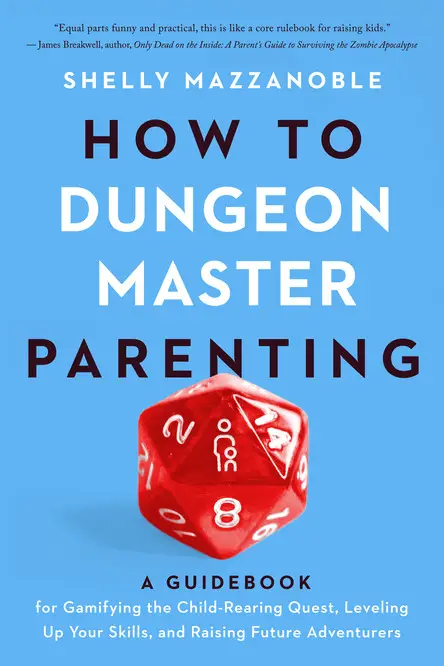Running a TTRPG game for others, also known as “dungeon mastering,” is not easy. Whether it is managing schedules, preparing for the unexpected and keeping all players (and characters) happy and healthy is a task in itself. It may also have something to teach parents if they’re inclined to listen.
How to Dungeon Master Parenting is Shelly Mazzanoble’s look at what the two practices have in common. Mazzanoble, a Substack blogger and coauthor of Welcome to Dragon Talk, penned this book as her exploration of what the two have in common and how parents can use DMing talents to help inform their parenting. These involve everything from moral alignments to storytelling styles.
The Fandomentals got a chance to sit down with Mazzanoble and discuss her book, her parenting and her favorite 5e spells as a parent.

The Fandomentals: Where did this book come from?
Shelly Mazzanoble: The book was born of my insecurities as a parent. I’m the mother of an 11-year-old son, and like most parents, we spend a lot of time wondering, “Are we doing this right? Is he having fun? Does he even like me?” Questions like that, which I realized are the same questions I ask when I’m DMing. The big difference for me was that I handle surprises a lot better in a DND game as a dungeon master than I do as a parent.
I realized some similarities as I was explaining to someone what I think makes a good Dungeon Master; it was a lot of the same adjectives that we use to describe what might make someone a great parent. It’s someone who’s collaborative, open-minded, generous, compassionate, empathetic, accepts feedback and can play to different personalities.
So I started to ask myself, “Can you approach parenting with the same philosophy that a DM would approach a game?”
FM: What sort of DMing have you done in the past?
SM: I am a new dungeon master myself. I’ve had some false starts over the years, but for the last couple of years, I’ve taken on the role of Dungeon Master for kids, and only kids.
It’s what led me to realize that you have no idea what will happen other than some basic survival skills, like how to install your car seat and how to change a diaper, those kinds of things. You’ll be anxious about millions of things and worry about them, but that may never happen. You can’t prep for the worst because you don’t know what you’ll get. That lesson took me a long time to learn as a dungeon master. Still, once I realized, “This game belongs to all of us, and this story is going to unfold in beautiful ways in front of us. I don’t have to control everything,” everything became a lot easier.
That’s the approach I implement in parenting. As someone who’s skilled at improv, I realized that one of the greatest gifts a parent can give their kid is agency, the same way that a dungeon master allows players to have agency in their game.
But it’s important to note that your kids are different. They’re different from their siblings. They’re different from kids that your friends have. They’re different from your nieces and nephews. So they’re all going to be different, and Dungeon Masters have to be really, really good at understanding the different personality types and being able to include everyone in the game.

FM: How does your DMing for children impact how your view of parenting and the parallels?
SM: Because I am a dungeon master for kids, some of my parenting habits come in to those games.
For example, I might have a player who doesn’t want to rest up or heal and wants to keep exploring after nearly dying in-game. Meanwhile, the mother in me is like, “you will go sit down under that tree and you will drink a healing potion, young man,” I can’t stop being a mother in that way. Still, I don’t think you need to be a good parent, to be a good dungeon master, but I do believe that being a good Dungeon Master can make you a better parent.
FM: How do the practices around DMing for children contrast with DMing for adults?
SM: I have DMed for adults, but I just put too much pressure on myself because I could tell they knew way, way more about the game than I did. So I felt like I had to be really good at it. But I think the core principles of DMing still apply. Being somebody who’s empathetic, a good listener, and likes to collaborate and share in storytelling is just a hallmark of what makes a good Dungeon Master.
FM: How do parenting styles and player styles connect?
SM: So you’ve probably heard of helicopter parenting, or attachment parenting or gentle parenting. There’s all these different styles of parenting. There’s also a lot of different parenting styles. I found a lot of parenting parallels between these styles and DMing styles. For example, a DM who prefers to lean into the rule of cool, lay out the story, describe all the parts, and help the characters with their backstories is more like gentle parenting. Perhaps you’re a GM with a more authoritative approach and want to guide the players toward a more directed approach. That could be considered more helicopter parenting.
There are just a lot of common parallels between parenting archetypes and DM archtypes and finding the comparisons was just fun.
FM: Where do you find yourself landing as a parent and GM?
SM: Before becoming a parent, I thought I would be more like a tough-love parent. That was how I was raised, and that’s not the kid I got. He did not respond to that. Even if I had to raise my voice to say, “Don’t cross the street,” when he was a lbaby, he would get distraught at someone raising their voice. So I have found that I err more on the gentle parenting side, which is the one that I equate with the narrator-focused dungeon master. That also happens to be my favorite style.
FM: Are there any magical items or spells that you’d love as a parent in real life?
SM: The first one that comes to mind is Mage Hand. I’d love to have that to grab things while I’m holding my baby and need a drink of water. I’d love a familiar who could also help with stuff. Mage armor would also be really help so I can forever protect my child.
How to Dungeon Master Parenting: A Guidebook for Gamifying the Child-Rearing Quest, Leveling Up Your Skills, and Raising Future Adventurers will be available at your local bookstore on Nov. 12, or the University of Iowa Press’ website.
Images via University of Iowa Press
Have strong thoughts about this piece you need to share? Or maybe there’s something else on your mind you’re wanting to talk about with fellow Fandomentals? Head on over to our Community server to join in the conversation!


